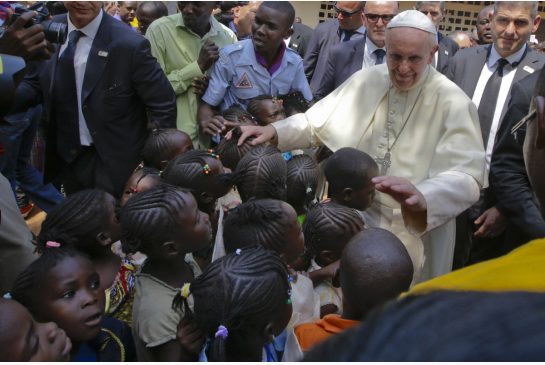Pope heads to Central African Republic with peace message
The pope is expected to shift message to pressing geopolitical concerns when he arrives on Sunday in Bangui, the capital of the Central African Republic, where deadly violence between Christians and Muslims has flared recently despite the presence of a United Nations peacekeeping force.
The Vatican has refused to say whether Francis will discuss gay rights openly during his six-day trip to Africa which kicked off in Kenya on Wednesday. A mix of Vatican, U.N. and other security forces were on hand.
While sectarian clashes have left at least 100 people dead over the last two months, in recent days Bangui has been relatively free of gunfire.
The 78-year-old pope preached a message of love and peace on Saturday as he ditched his prepared remarks to address the rally for young people in the capital Kampala.
But in a statement before the visit, the pope made his intentions clear: “I wish with all my heart that my visit can contribute…to dressing the wounds and opening the way to a more serene future for Central African Republic and all its inhabitants”.
Francis is receiving a rousing welcome from the crowd, driving around on his open-sided popemobile as fans cheer wildly.
“Work, pray, do everything for peace”, he said at the camp.
Interim President Catherine Samba-Panza said on Saturday that the event could mark a turning point in the fighting, which has pitted neighbor against neighbor. “He knows that things have happened in our country and maybe he has come to ask God to save us”, said Fidele Nodjindorom who lives in a camp for the displaced that the pope is due to visit.
“Everything has been done to ensure the safety of the pope… there is no real threat”, said CAR Public Security Minister Chrysostome Sambia, while admitting there have been reports of “ill-intentioned groups in some areas”.
France sent in soldiers in 2013 in an attempt to stem the violence.
The mainly Muslim rebels behind the coup went on a rampage that triggered the creation of the equally unsafe anti-Balaka militia in mostly Christian communities. Tens of thousands of Muslims have fled to the far north, creating a de facto partition.
At each venue, Francis sought to remind Ugandans of their strong Christian roots – the former British colony is 47 percent Catholic and 36 percent Anglican – and to apply their faith to today’s challenges.
MINUSCA has received extra soldiers and will deploy between 3,000 and 4,000 troops.
Central African Republic was organizing democratic elections for December when the death of a young Muslim taxi driver in late September reignited tensions.
Bangui is the final leg of his first African trip that has already taken him to Kenya and Uganda.








